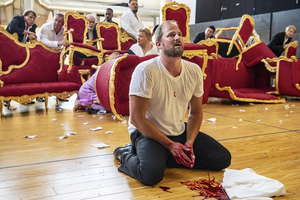WAR AND PEACE Will Be Performed at Grand Théâtre de Genève
Performances run September 13, 15, 17, 21, 24, 2021 – 7pm and September 19, 2021 – 3pm.

Tah-dah! What a massive drum roll to open a season! Prokofiev's most monumental opera (and probably also of the entire Russian repertoire) finally arrives in Geneva: War and Peace should, according to some, be called Peace and War. Inspired among other things by the recent invasion of Russia by Nazi Germany and the breaking of the Molotov-Ribbentrop pact, Sergei Prokofiev, the prodigal son who had returned to his homeland only a few years earlier, tackled Leo Tolstoy's colossus to create this work of monumental disproportions.
Libretto by the composer and Mira Mendelson after the novel by Leo Tolstoy
First performed in 1946 in St. Petersburg
For the first time at the Grand Théâtre de Genève
Coproduction with the Hungarian National Opera
Performances run September 13, 15, 17, 21, 24, 2021 - 7pm and September 19, 2021 - 3pm.
Learn more at https://www.gtg.ch/en/2021-2022-season/war-and-peace/.
It wasn't the composer's first attempt to make Russian prose sing. He had already tackled the great Dostoyevsky with The Gambler when he graduated from the conservatory. He had to wait until 1929, fifteen years, before the work was finally premiered in Brussels. Each of his operas met with a similar fate, but this did not stop Prokofiev from continuing to imagine and write The Love of Three Oranges and The Fiery Angel during his years of exile, and Semyon Kotko and Betrothal in the Monastery on his return to Russia. Obviously, War and Peace was not spared these vicissitudes: a dialogue of the deaf set in as soon as the composer himself presented the song-piano version to the party authorities; versions and accidents followed one another. The work was not premiered in its entirety until the end of 1959, six years after the death of the composer, who died one day before Stalin.
Is it as a response to this fracas that the scenes of Peace stand among the most beautiful intimist tableaux that Prokofiev ever wrote for opera, by contrast with the Tsarist - or should we say Soviet - tableaux that constitute the most part of the second half War, where the composer dutifully performs the requisite journalistic propaganda and glorifies the Russian generals and their victory over the Napoleonic troops? Nevertheless, in this fragmented fresco of individuals lost in the mass, Prokofiev masterfully manages to narrate the passage from individual adventure to popular struggle, to one great tale of love and death, perhaps even with true nationalist feeling.
Directing the seventy-two characters is Calixto Bieito, one of the greatest living opera directors, working for the first time on the Geneva opera stage. The emotional intensity that Bieito, an expert in crowd scenes, is able to build will be musically upheld by the young Argentine conductor Alejo Pérez, who is increasingly seen on European opera stages. He tackles this masterful score alongside a highly diverse cast of soloists that will mix great Russian voices with other major talents from all over the opera world - Ruzan Mantashyan, Dmitry Ulyanov and Björn Bürger, to name a few.
Comments

Videos
